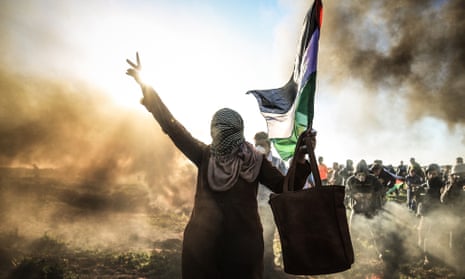We, Israelis committed to peace, strongly welcome the report of the UN inquiry into the horrifying killing of Palestinian demonstrators in Gaza (UN says Israel may be guilty of war crimes over Gaza, 1 March). The UN report confirms that almost none of the 189 Palestinians killed and over 9,000 injured by our forces in the weekly demonstrations since last March posed any direct threat to Israel or to its citizens. Many were shot while peacefully protesting hundreds of metres away from the Gaza fence.
The 2 million inhabitants of Gaza are caged in an open-air prison, forcibly isolated from the rest of Palestinian society. These people have every right and reason to protest, yet are shot at with live ammunition when they do so.
The UN Human Rights Council, which mandated the inquiry, is an imperfect body, but the UN commission of inquiry was independent. Its report is a truthful and objective indictment of Israel’s brutal crackdown, while also addressing Palestinian violations.
As the first anniversary of the start of the protests on 30 March draws closer, the world must put a stop to this ongoing killing. Next week, countries of the world will have to take a position on the UN report at the Human Rights Council in Geneva. We urge all countries, including the UK, to support it unambiguously.
Prof Michael Ben-Yair Former attorney general of Israel and former acting supreme court judge
Avraham Burg Former Speaker of Knesset and head of the Jewish Agency
Dr Ilana Hammerman Israeli writer and translator
Prof David Harel Vice-president of the Israel Academy of Sciences and Humanities, Israel Prize recipient (2004), EMET Prize recipient (2010)
Alex Levac Israel Prize recipient (2005)
Prof Yehuda Judd Ne’eman Israel Prize recipient (2009)
Prof David Shulman Israel Prize recipient (2016) and EMET Prize recipient (2010)
Prof Zeev Sternhell Israel Prize recipient (2008)
Thank you for your perceptive article, which gives not only a good overview of the realities and recent history of life in the West Bank and Israel but also Palestinians’ perspectives on one as opposed to two states (The struggle for peace: One-state solution gains ground among Palestinians battling for rights, 14 March).
Indeed the one-(democratic)-state’s time has come: inequality for Palestinian citizens of Israel, progressively less space and autonomy in the West Bank, no longer even a wisp of sovereignty over Jerusalem – all played against the tired political cantus firmus of the two-state mantra – has led Bassem Tamimi, Saeb Erekat, Fadi Quran and thousands of others to openly stand up for a single democracy in historic Palestine.
There are now at least six groups worldwide that are organised to promote one democratic state (ODS), based in the West Bank and Gaza, in Israel, in England, in Switzerland, in the US and in Holland. Over a decade ago four seminal books on ODS came out – by Ghada Karmi, Ali Abunimah, Virginia Tilley and Mazin Qumsiyeh. A dozen academic/activist conferences on ODS have been held in as many years. The idea that all Palestinians (yes, including the refugees) can be citizens alongside all present citizens of Israel in a reunited country is, for those who believe in human rights and a normal democracy, the only solution.
Blake Alcott
Director, ODS in Palestine
